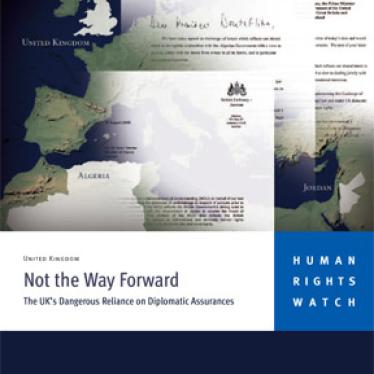(London) - The UK government should not rely on unreliable "diplomatic assurances" against torture to deport national security suspects to Ethiopia, Human Rights Watch said today in a letter to the UK government.
In December 2008, the United Kingdom and Ethiopia signed a memorandum of understanding (MoU), similar to those the UK has signed with Jordan, Lebanon and Libya. Under these MoUs, the receiving governments provide "diplomatic assurances" that they will not mistreat persons whom the other country transfers to their territory. Under the agreement, Ethiopia will obtain custody of its citizens now in detention in the UK, while the UK will be able to deport to their home country Ethiopians it considers security threats.
"The UK-Ethiopia agreement is intended to get around the absolute ban on returning people to countries where they are at risk of torture," said Tom Porteous, London director at Human Rights Watch. "Ethiopia has a grim record of torture, particularly where suspects are perceived as security threats, and empty promises from Addis will not remove that risk."
Human Rights Watch and other organizations have documented the use of torture by Ethiopian police and military officials in both official and secret detention facilities across Ethiopia. Concerns about torture, ill-treatment, and lack of due process are often gravest when individuals are detained on suspicion of affiliation with armed opposition, insurgent, or terrorist activity. In some cases suspects are tortured during interrogations, while in other cases they are tortured as punishment.
Methods of torture include: repeated and severe kicking and beating of a naked suspect with sticks, electric cables, rifle butts, iron bars or other instruments, sometimes at gunpoint; tying an individual's hands and feet, then suspending the person upside down and administering a beating; tying bottles of water to a man's testicles; and forcing a detainee to run or crawl barefoot over sharp gravel for several hours at a time. Human Rights Watch has also documented cases of rape of women and girls detained in military barracks in the country's eastern Somali region.
"Ethiopia's record of torture of security suspects is all too clear," said Porteous. "The agreement is itself a tacit admission that torture continues to be a major problem in Ethiopia."
The agreements Britain has reached with Ethiopia and other states represent an effort to circumvent the strict non-refoulement (no return) obligations under the UN Convention against Torture and the European Convention on Human Rights.
Both treaties absolutely prohibit returning people to places where they face a substantial risk of torture. The bodies that enforce compliance with the two treaties, the Committee Against Torture and the European Court of Human Rights, have both repeatedly made clear that no exceptions are permitted to the ban on returns to torture, even where the suspect is alleged to pose a threat to national security.
The MoUs contain a measure that purports to act as a safeguard against abuse: establishment of a body, nominated jointly by the two signatory governments, which can periodically visit and privately interview anyone the receiving state takes into custody, and then report on those visits to the sending state.
In reality, such post-return monitoring will not protect returnees from torture. Its key deficiency is the lack of confidentiality. Where monitors have universal access to all detainees in a facility and are able to speak with detainees in private, a single detainee can report torture without fear of being identified by the authorities. The International Committee of the Red Cross makes universal access a condition of its monitoring for precisely that reason.
But under the British MoUs, with only one detainee or a small group being monitored, such confidentiality cannot be provided. If abuse is reported, the prison or detention facility authorities will know directly where the allegations of ill-treatment came from. Experience has shown that detainees are reluctant to report abuse in those circumstances for fear of reprisals against them or their families.
Moreover, the "independent" monitoring body identified to monitor returns under the UK's agreement with Ethiopia is the Ethiopian Human Rights Commission, a government-sponsored organization whose members are appointed by the ruling party-dominated Ethiopian parliament.
"Expecting an Ethiopian government-sponsored commission to monitor torture cases is farcical, especially when Ethiopia is fast becoming one of the most inhospitable places in the world for independent human rights investigation," said Porteous.
The European Court of Human Rights has ruled against efforts by the UK and other European governments to rely on assurances as grounds for returning national security suspects to countries with poor torture records, concluding that the use of assurances did not remove the risk faced by the suspects.
The court is currently considering a case brought by a Jordanian terrorism suspect against the UK, challenging its efforts to deport him to Jordan under the MoU with that country, following a February ruling by Britain's Law Lords that the suspect could be returned.
In April 2008, Britain's Court of Appeal rejected the return of two national security suspects to Libya under the 2005 MoU between London and Tripoli, concluding that they remained at risk of torture. The UK government did not appeal that ruling.







